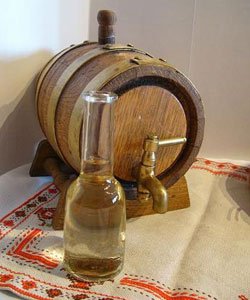

© Photo: Lyudmila Savova
In times of crisis a number of Bulgarians are concerned with prices and wonder which type of rakia is cheaper. The homemade, of course. Production of rakia at home is a part of the Bulgarian culture in a number of regions. The tradition is attractive to foreigners, too. Two years ago the retired English policeman Michael Weavers, who now lives in the Bulgarian village of General Toshevo won the local rakia competition. The locals now call him with respect Bai Michael.
It is known that monks from the monasteries near the town of Troyan in Central Bulgaria are masters of the plum rakia, which is prepared according to a recipe from the 19th century. At least 12 different types of herbs are used but special varieties include 33 herbs. In the monasteries the rakia is stored in oak casks. Before pouring the rakia into bottles, it is blessed in front of an icon of St. George.  Vassil Mandzhukov from the village of Oreshak told us more about the tradition of rakia production. “You should only drink rakia that has aged for 12 years,” he claims. “When we make rakia, we keep it in an oak cask for 6 months, before pouring into glass bottles and burying them in the ground,” he explains and adds: “Aged rakia has different qualities and that is why my father diet at 95.”
Vassil Mandzhukov from the village of Oreshak told us more about the tradition of rakia production. “You should only drink rakia that has aged for 12 years,” he claims. “When we make rakia, we keep it in an oak cask for 6 months, before pouring into glass bottles and burying them in the ground,” he explains and adds: “Aged rakia has different qualities and that is why my father diet at 95.”
English: Alexander Markov
Every child dreams of having all the time in the world in which to play and enjoy piles of sweet delights. One of the most favorite, of course, is His Majesty the Chocolate. The first records of its appearance can be found as early as 2,000 years before..
A little over 1,450 Leva is the sum needed per month by an individual living in a one-person household, and a total of 2,616 Leva for the monthly upkeep of a three-member household - as is the most widespread model in Bulgaria at the moment (two..
The traditional "Easter Workshop" will be held from April 23 to 26 in the Ethnographic Exposition of the Regional History Museum - Pazardzhik. Specialists from the ethnographic department of the museum will demonstrate traditional techniques and..
A little over 1,450 Leva is the sum needed per month by an individual living in a one-person household, and a total of 2,616 Leva for the monthly..
Every child dreams of having all the time in the world in which to play and enjoy piles of sweet delights. One of the most favorite, of course, is His..

+359 2 9336 661
